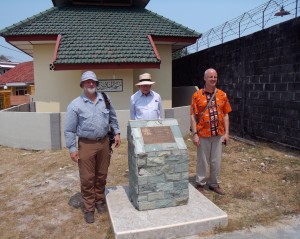The following is mainly based on the web site: ‘Australia’s War 1939-1945‘.
Because of the increasing threat of war with Japan, the Australian Trade Commissioner in Shanghai, China, Mr Vivian Bowden, was instructed to close the Shanghai post and to establish an Australian Government Commission in Singapore. Bowden arrived in Singapore in September 1941 with his assistant trade commissioner, Mr Norman Wootton, and political secretary, Mr John Quinn. They set up their new office in the Union Building at Collyer Quay.

From 8 December, when the Japanese invaded Malaya and began pushing the British Empire forces south down the Malayan peninsula, Bowden sent cables to Australia advising the government of the worsening military situation.
On 31 January 1942, the last of the forces that had been defending Malaya withdrew from the Malayan Peninsula over the Johore Causeway onto Singapore Island. The causeway was then blown up. Bowden realised the next battle was for Singapore itself.
When Japanese forces landed on Singapore Island on 8 February 1942, pushing back troops defending the north and east of the island, Bowden knew that he and his colleagues were in a dangerous situation. He cabled the Department of External Affairs in Canberra requesting immediate advice about the possibility of them evacuating Singapore on a departing cargo steamer.
The Department advised Bowden: We appreciate your difficulties but think you should stick to your post. Otherwise we shall be deprived of independent information and effect on morale would be bad.
On 9 and 10 February, Bowden also wrote to his wife about the situation:
Meantime I – with visions of you and the family before me – got Wootton and Quinn and together we concocted a telegram to External Affairs giving them the outlook here and asking their views as to my leaving – failing receipt of which I said I would use my discretion. After dinner Norman and I packed and moved down to the office to sleep partly to be ready, and partly because the shells have been whistling over our house the last two mornings and there have been several casualties in the neighbourhood. (The first morning they shelled us I was on my way to the office and spent 15 minutes in a deep open drain with the syce [driver] while shells whined and crashed all around.) However, at about 1 a.m. a reply to my telegram came. They appreciate ‘my difficulties’ but feel that I should stick to my post. Otherwise they would be without independent information (probably for a day!) and the effect on morale would be bad. I think this must have been concocted in a hurry and that they really meant that for the sake of prestige I had better stay, for my going would not hurt anybody’s morale. Anyway there it is. Naturally I am very disappointed, for the opportunity seemed God-sent, but if my staying upholds national prestige I’m not going to complain. But I don’t see why they shouldn’t let Norman and John go. However they’ve promised to cable again within twelve hours, so perhaps they will do this.
On 11 February 1942, Bowden was advised that: … if the worst comes, you and your staff are to insist on receiving full diplomatic immunities, privileges and courtesies.
The cable also assured him that the Australian Government would insist on: you and your staff being included in any evacuation scheme agreed on with Japanese Government.
Bowden sent his last message to Australia at 11.00 am on 14 February 1942 advising that his work was completed and that he would: telegraph from another place at present unknown.
That evening he, Quinn, and Wootton escaped from Singapore on a small 40-foot [12 metres] launch, the Mary Rose. Further details of that escape can be read HERE (<— External link).
The Death of Vivian Bowden – 17 February 1942
The Mary Rose was captured by the Japanese and escorted into Muntok Harbour. As Mr Bowden entered the cinema, he spoke up in support of a British soldier who was found to have an oil can for a rifle in the bag he was carrying – not his own kit bag, as this had been lost at sea.
Following this, a Japanese or Korean soldier tried to take Mr Bowden’s gold watch and identity disc. Mr Bowden had lived and worked in Japan in his family’s silk business and was bilingual. He asked to speak to a senior Japanese officer, to explain his Diplomatic status, as were his official orders, and to request proper treatment for the captives.
Enraged by the discussion, a Japanese or Korean soldier pushed and hit Mr Bowden and, with a second soldier, took him outside. Shots were heard – a witness later told of Mr Bowden’s being forced to dig a shallow hole and collect a small bunch of flowers before being killed and pushed into the grave.
In November 2011 a memorial plaque to Vivian Bowden was placed near the Muntok Cinema. Vivian’s son Ivor Bowden, his son Charles and daughter Katherine came to Muntok with other relatives of internees and spent several days there. Mr Agus Tarmidzi, a former Indonesian Ambassador to The Hague and United Nations and who was born in Muntok came from Jakarta to greet Mr Ivor Bowden, who had been Australia’s Ambassador to Pakistan and Iran. A YouTube video of the event was recorded and can be viewed HERE.
September 2015: The Bowdens return: The son of Vivian Bowden – Ivor Bowden with his sons Charles & James returned to Muntok with a group of other relatives of internees.

Below the memorial to Bowden outside the cinema where Vivian was shot by Japanese guards:
